Civil War
By February 1, 1861, seven Southern states had seceded from the Union, and formed the Confederate States of America. On April 12, Confederate shore batteries in Charleston Harbor opened fire on Fort Sumter. After thirty-four hours of bombardment, the fort surrendered. On April 15, President Lincoln declared that “insurrection” existed and called for volunteers. With this pronouncement, Lincoln introduced nineteenth-century Americans to the event that would inexorably alter their lives. In Ithaca as elsewhere, there were meetings, rallies, and enlistment drives. The Cornell family was caught up in the war effort. Ezra Cornell headed a citizens’ committee to organize aid for the dependents of volunteers and personally subscribed $1000. Mary Ann Cornell was president of the Ladies’ Volunteer Aid Association.
In mid-July 1861, as a member of the Volunteer Aid Committee, Ezra traveled to Washington with medical supplies. Refused a pass through the lines to the main camp of the Union Army, the group journeyed to Alexandria, Virginia, and joined a troop train to Fairfax Station. Setting out on foot for the front, they found themselves at the first battle of Bull Run, an adventure Ezra recounted in a letter home to Mary Ann and in a letter to the Ithaca Journal. He remained in Washington, visiting hospitals and traveling to the camp where the Tompkins County volunteers were stationed.
While in Europe at the International Exposition in 1862, Cornell sponsored the passage of four volunteers who were anxious to join the Union Army. Many of his relatives served in the army. His younger brother Daniel was wounded while with Grant’s army at Vicksburg, and his nephew Irving died of wounds received in battle. As a state legislator, Cornell received letters from constituents requesting his help in obtaining promotions for local officers. Throughout the war, he continued to visit the wounded and to aid soldiers and their families.
 |
Civil War Cover [zoom] |
 |
Civil War Cover [zoom] |
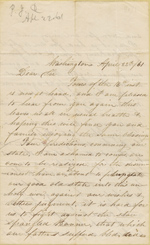 |
Paul J. Cornell. Letter to Ezra Cornell. Washington, D. C., April 22, 1861. [zoom] | View/download a PDF of this item Ezra Cornell corresponded with a cousin in North Carolina, Paul Cornell. Paul did not believe that North Carolina would secede. After Lincoln’s call for volunteers, however, North Carolina voted for secession along with the other border states of Virginia, Arkansas, and Tennessee. Paul’s sons served in the Confederate Army. When they were captured, Ezra arranged for their release from prison. Your predictions, concerning our state, I am ashamed to confess, are come to be realized for the disunionist[s] have or are about to plunge our good old state into this unholy war against our wishes & better judgment. It is hard for us to fight against the Star Spangled Banner, that which our fathers suffered, bled, died and won for our enjoyment.
|
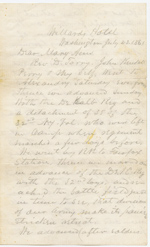 |
Ezra Cornell to Mary Ann Cornell. July 23, 1861.
Gift of Carolyn Blair Sheffield, great-granddaughter of Ezra Cornell, in 1998 [zoom] | View/download a PDF of this item Ezra Cornell wrote to his wife describing his harrowing 35-mile retreat with the Union Army from the site of the Battle of Bull Run in northern Virginia, the first battle of the Civil War, where he had gone with his son Oliver Hazard Perry Cornell and two companions to deliver medical and other supplies to the 32nd New York Regiment, which included volunteers from Ithaca. He also sent a longer dispatch reporting on his groupís adventure to the Ithaca Journal, which published his report on July 31, 1861. Willards Hotel Washington July 23, 1861
Dear Mary Ann Rev. D. Torry, John Kendall, Perry & my self went to Alexandria Saturday eve. from thence we advanced Sunday with the De Kalb Reg and a detachment of 35 of the 32nd NY Vol. who were left in camp when regiment marched a few days before. We went by RR to Fairfax Station, thence we moved on in advance of the De K. Reg. with the 32nd boys and reached the battle field just in time to see that division of our army make its panic stricken retreat. We advanced (after soldiers left us on their retreat) a few miles further on, to where we found some of our army rallying and forming. Now it was 8 P.M. and our party got separated. I went to looking them up, first found Mr. Torry, next found Perry, and finally found Kendall, and we retreated down the road toward F. Court Ho with the retreating straglers & baggage of army about one mile. There we turned to the right across fields half a mile got [supper?] to a secession farmers house. Went to bed about 10 P.M., slept well till one A.M. Monday morning when Kendall (who could not sleap) awoke me and whispered to me that he heard a nois about the house that made him think we were betrayed by our host and would be surrounded & captured. We dressed, called up the servant paid our bill $2 to him & left on our march back to Alexandria. By daylight it began to rain. We reached Alexandria about 2 P.M. in a drenching rain after a steady march of 25 miles, wet, sore, and tired. Could not pass the lines at Alexandria had to stay there till this A.M. when we got a pass to cross the lines and walked to Wash 10 miles. We have some trofies. Perry thinks he has seen enough of war. I think he will start for home in day or two. I shall not remain here a great while before I leave for home. The 32 Reg has got back to camp all well none killed or wounded. I think the Ithaca boys have safe officers and wont require any hospital stores. Yours affectionately, E. Cornell |
 |
Civil War Cover [zoom] |
 |
Civil War Cover [zoom] |
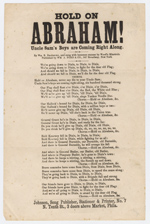 |
William B. Bradbury. Hold on Abraham! Uncle Sam’s Boys Are Coming Right Along. New York: Wm. A. Pond & Co., [ca. 1863]. [zoom] |
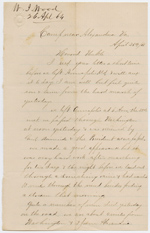 |
W. Irving Wood. Letter to Ezra Cornell. Camp near Alexandria, Virginia, April 26, 1864. [zoom] | View/download a PDF of this item We left Annapolis at 6 AM the 23rd inst. We passed through Washington at noon yesterday and was reviewed by Genl Burnside & the President as we passed. We made a good appearance but it was very hard work after marching for two days & the night before we laid out through the drenching rain & had marched 10 miles through the mud besides fording a stream that morning. Quite a number of men died yesterday on the road.
|
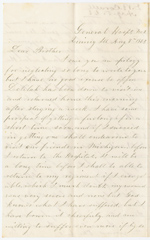 |
D.B. Cornell to Ezra Cornell, August 3, 1863. [zoom] | View/download a PDF of this item In this letter, Daniel B. Cornell gives a detailed account of his participation in the Battle of Vicksburg and the near fatal injury he suffered in the assault. I received my wound on the 19th of May at the first charge on the works in the rear of Vicksburgh. Our Brigade charged on what was called Fort Hill . . . my position was colour bearer and I had to go down a small ravine which was in the hillside . . . I was struck directly under and about 3/4 of an inch from my left eye . . . I did not fall, nor did the colours go down . . . I then went and lay down behind a fallen tree expecting to bleed to death . . . the ball had apparently struck the limb of a tree and was comeing diagonaly down as it passed through my hat rim over my left temple, it passed through the roof of my mouth cutting an ugly gash on the inside of my right cheek and lodged at the angle of my jaw shattering it severely.
|
 |
Civil War Cover [zoom] |
 |
Civil War Cover [zoom] |
 |
Civil War Cover [zoom] |
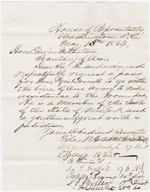 |
Petition by members of New York State Senate to Secretary of War Edwin Stanton. May 13, 1864. [zoom] The undersigned respectfully request a pass for Hon. Ezra Cornell to go within the lines of our Army to render assistance to the wounded.
|
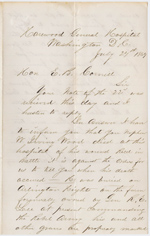 |
John G. Apgar. Letter to Ezra Cornell. Harwood General Hospital, Washington, D. C., July 24, 1864. [zoom] | View/download a PDF of this item Apgar informs Cornell of the death of his nephew W. Irving Wood from wounds received in battle, July 24, 1864. He was buried on Arlington Hights on the farm formerly owned by Gen. R .E. Lee at present commanding the Rebel Army his and all other graves are properly marked and a record kept so that if the friends wish to they can remove the body in the fall . . .
|
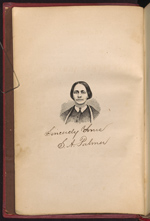 |
Sarah A. Palmer. The Story of Aunt Becky’s Army-Life. New York: John F. Trow, 1867. [zoom] | Additional images: 
Sarah Palmer was an Ithaca woman who served as a nurse with the 109th New York Regiment. An article in the Ithaca Journal, December 28, 1864, referred to her as “Our ‘Florence Nightingale.’” |